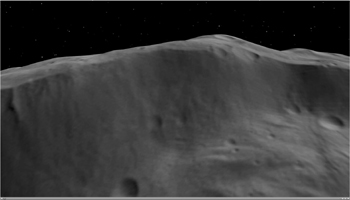Wall of Rheasilvia

Click on the image for the video
This animation made from data obtained by NASA's Dawn spacecraft shows the topography of a portion of the wall and interior of the Rheasilvia impact basin (310 miles or 500 kilometers in diameter) in Vesta's south-polar region. This basin affected Vesta's global shape and geology.
The flyover was made from images obtained by Dawn's framing camera during high-altitude mapping orbit (on average 420 miles or 680 kilometers above the surface). For other related movies of the Vesta surface, see http://www.jpl.nasa.gov/video/index.cfm?id=1020 and https://photojournal.jpl.nasa.gov/catalog/PIA15140.
The Dawn mission to the asteroids Vesta and Ceres is managed by NASA's Jet Propulsion Laboratory, a division of the California Institute of Technology in Pasadena, for NASA's Science Mission Directorate, Washington. Dawn is a project of the directorate's Discovery Program, managed by NASA's Marshall Space Flight Center in Huntsville, Ala. UCLA is responsible for overall Dawn mission science. The Dawn Framing Cameras have been developed and built under the leadership of the Max Planck Institute for Solar System Research, Katlenburg-Lindau, Germany, with significant contributions by DLR German Aerospace Center, Institute of Planetary Research, Berlin, and in coordination with the Institute of Computer and Communication Network Engineering, Braunschweig. The framing camera project is funded by the Max Planck Society, DLR, and NASA/JPL.
More information about the Dawn mission is online at http://www.nasa.gov/dawn and http://dawn.jpl.nasa.gov.
